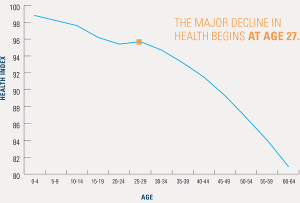 A recent report published in April 2019 by the USA based Blue Cross Insurance Group reveals a worrying trend in declining health of people born between 1981 and 1996, a demographic given the moniker of ‘millennial’. This follows a report in 2017, published in the Journal of the American Medical Association that exposed a growing gulf in life expectancy between the poorest and wealthiest people, and worse still, children born in at least 13 counties were expected to live shorter lives than their parents would have in 1980. Other studies have correlated the change in body mass ‘obesity’ as a primary risk factor for early demise and longer periods of health compression.
A recent report published in April 2019 by the USA based Blue Cross Insurance Group reveals a worrying trend in declining health of people born between 1981 and 1996, a demographic given the moniker of ‘millennial’. This follows a report in 2017, published in the Journal of the American Medical Association that exposed a growing gulf in life expectancy between the poorest and wealthiest people, and worse still, children born in at least 13 counties were expected to live shorter lives than their parents would have in 1980. Other studies have correlated the change in body mass ‘obesity’ as a primary risk factor for early demise and longer periods of health compression.
But this is not simply a USA problem, here in the UK a trend in reduction of life expectancy has been identified, with a mean reduction of 6 months today Vs levels seen since 2015, a pattern again identified by an insurance company analysis. With younger generations facing health challenges at earlier ages than previous generations, measuring the health of millennials is critical to identifying and improving this generation’s long-term health and wellness.
 Of particular concern is the statistic that shows millennial’s health major decline begins at the age of just 27. When compared to the national population, millennials were more affected by behavioural health conditions. Major depression, hyperactivity and type II diabetes had the largest growth in prevalence for millennials during that time span, with women experiencing a 20% higher level of adverse health than males.
Of particular concern is the statistic that shows millennial’s health major decline begins at the age of just 27. When compared to the national population, millennials were more affected by behavioural health conditions. Major depression, hyperactivity and type II diabetes had the largest growth in prevalence for millennials during that time span, with women experiencing a 20% higher level of adverse health than males.
Mental health is a particular issue for UK millennials, A survey commissioned by the Varkey Foundation questioning the attitudes and opinions of more than 20,000 15-21 year-olds from across the world ranked British teenagers and young adults in 19th place out of 20 participant countries. Millennials are also feeling the pressure at work. According to a study conducted by the Mental Health Foundation over a quarter of millennials (28%) state powering through stress is expected in their organisation’s culture, compared with just 12% of baby boomers. In addition, over a quarter of millennials (27%) often feel bothered by their stress levels during the working week as opposed to just 17% of baby boomers. Millennials in the UK it seems are on track to be the first generation to be less healthy than their parents by the time they reach middle age according to preliminary comments in a study undertaken by the Health Foundation.
In terms of friends, mental health and loneliness, the Health Foundation reports that “the proportion of young people who feel they have someone to rely on has decreased in recent years”. The number of young people reporting mental health issues, like anxiety or depression, has also been rising.
In addition, incidences of inflammatory bowel disease and functional gut problems are also on the rise in this population group, as described in the report there is a single generational increase of 15%.
Is there a connection and what can we do?
In 2012, Jeroen Raes of KU Leuven launched the Flemish Gut Flora Project. Sequencing faecal samples of over 3,000 healthy volunteers, Raes and his team defined the boundaries of a normal, health-associated gut microbiota. Next, the team turned to patient groups to identify microbiome alterations associated with diseases. In a study published in Nature Microbiology, they describe the so-called B2 enterotype, which is deficient in anti-inflammatory bacteria characterised by low bacterial abundances and biodiversity.
The associated increase in inflammation related to this presentation was also associated with lower quality of life, IBD generation and even depression, suggesting a relationship between the lack of diversity and mood amongst other metabolic complaints.
But what organisms, or group of organisms offer the best return on expansion and diversity increase, in other words are there a family or group of families that can be added or managed to induce changes in the immune and inflammation responses that would contribute to a reduction of the many behavioural and metabolic complaints that millennials and others are experiencing. i.e is there a magic bug!
Context
The intestine is in constant contact with the outside world and faces the challenge of upholding vital physiological processes and maintaining tolerance to the resident microbiota and innocuous environmental factors while concomitantly being poised to defend against infectious or noxious environmental insult.
To achieve homeostasis, the barrier site harbours a diverse, tissue-specialised cellular network. This network includes epithelial cell subsets, stromal cell populations that provide support to the tissue, neuronal networks that relay chemical messages across the body, and a diverse population of tissue-adapted immune cells. Immune cells, including Treg cells, are central to the tissue cellular network, and an iterative dialogue shapes both immune cell responses and tissue responses. This environment is intimately affected by food choice, and geography, medication and age, and represents an interface between behaviour and expression of health or disease.
Within this environment the gut bacterium Akkermansia muciniphila is associated with protection from obesity, inflammation and metabolic disease generation and is steadily gaining significance as a potential core bacterium in the management of lifestyle generated non communicable diseases.
Whilst it’s early days, supplementation with A. muciniphilia may present a fast track to restoration, but supplementation is not yet available commercially so a selection of food that favours the expansion of A. muciniphilia in the colon is a great place to start. Whilst vegetable fibres are clearly a useful start the extract pectin, from apples has shown itself to be an excellent growth medium along with a number of other agents which in turn favours the expansion of the Treg cells in the colon, delivering benefits for health systemically.
Conclusion
Whilst there are a number of intersecting challenges that mediate health in all of the population, and in particular represent challenges for millennials, there are clear simple steps that can be taken, and the first is the care and management of the diversity of the gut microbiota and the inclusion of fibrous foods and related supplemental support as needed. Then we may see a reduction in the speed of health decline and stabilisation of life expectancy, rather than a continuation of the trend.
